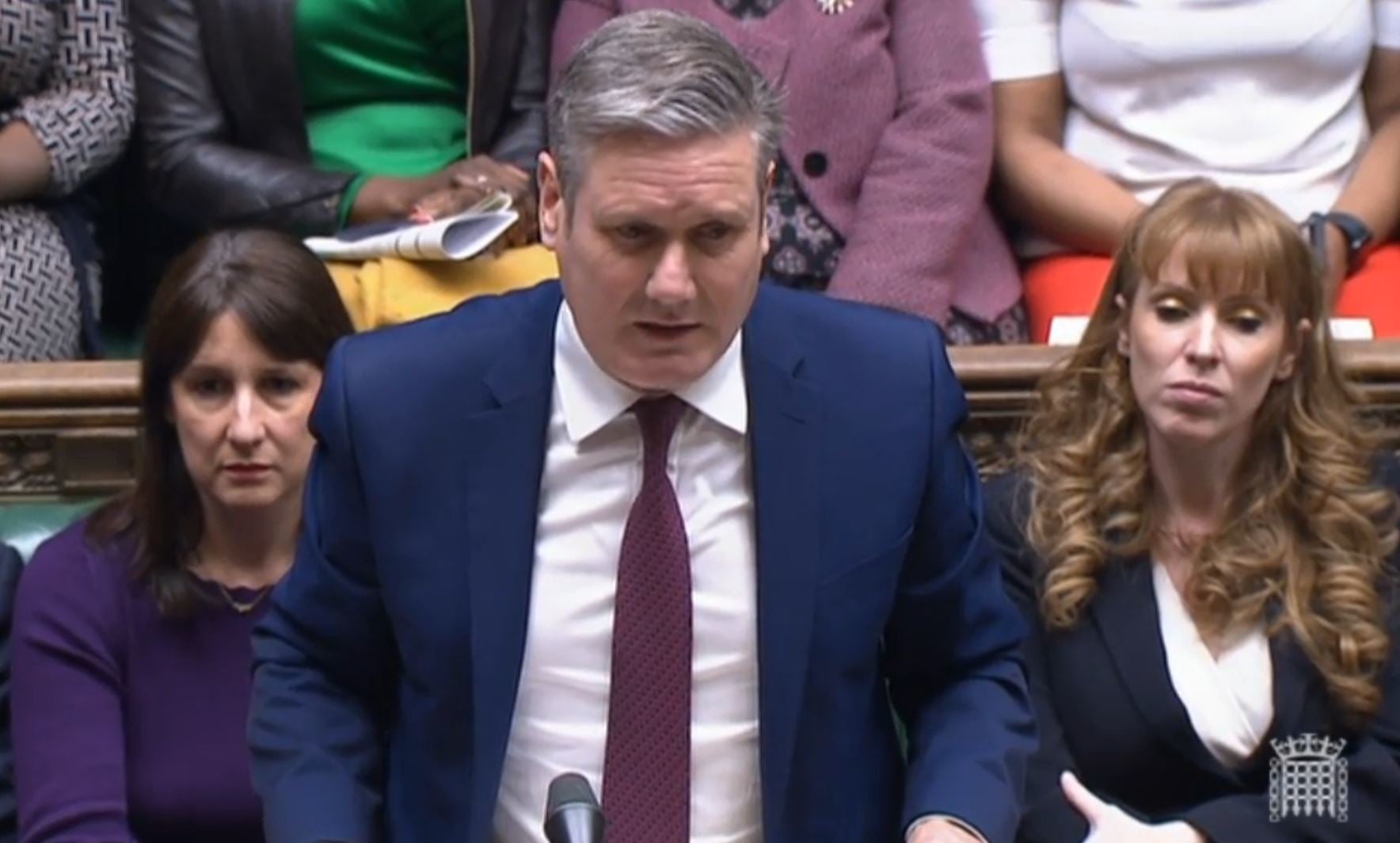Keir Starmer and Boris Johnson put on a show of unity while trading blows below the belt
The two leaders spoke piously of the need to work together against Vladimir Putin’s aggression, while seeking partisan advantage, writes John Rentoul


Keir Starmer and Boris Johnson tried to look as if they were rising above party politics while scoring party political points against each other. Starmer’s mission to distance the Labour Party from its recent history continued, as he simultaneously expressed support for the government and complained that its sanctions against the Putin regime didn’t go far enough.
The prime minister elaborately thanked the leader of the opposition for his support, and said that there were more sanctions to come. Starmer demanded that the government ask Ofcom to review the licence for RT, the Putin regime’s propaganda channel. Johnson innocently said that Nadine Dorries, the culture secretary, had already done so – knowing that her letter to Ofcom had just been published, too late for Starmer to know about it before he asked his question.
Having blunted Starmer’s attack with that cheap tactic, Johnson then outflanked Labour with a sanctimonious lecture on how governments shouldn’t close down TV stations – we believe in free speech, unlike Putin, he said. The implication that Starmer didn’t believe in free speech was allowed to hang in the air.
Starmer responded with his own partisan attack, however, criticising Johnson for failing to do enough to stop the “flood of foreign money drowning our politics”. We have very tough laws to stop foreign donations, Johnson replied. Starmer didn’t remind him that those laws were brought in by the last Labour government, after the Major government refused to act, but as that was before they were both MPs, perhaps that was understandable.
The idea that British democracy has been subverted by Russian money is one of those strange conspiracy theories that seems to be widely respectable among people whose hostility to Johnson has deprived them of the power of logic. If President Putin wanted to influence the last UK election, would he not have been subsidising Jeremy Corbyn, who thinks Putin has legitimate security concerns in Ukraine, rather than Johnson, who has at least tried to lead the international response seeking to deter Putin from military action?
As Johnson told Caroline Lucas, the Green MP, later on in PMQs, he had seen no evidence of “successful” Russian interference in British politics.
But to Starmer’s questions, Johnson went for the low ground of counter-attack, claiming that the “largest single corporate donation to the Labour Party came from a member of the Chinese Communist Party”.
Starmer tried to look dignified as he claimed the high ground in response. “We have to stand united and I am not going to be deflected from that,” he said. He delivered a short homily designed for news bulletins and social media clips: “Putin fears openness and democracy. He seeks division; we must stay united; he hopes for inaction; so we must take a stand; he believes that we are too corrupted to do the right thing; so we must prove him wrong.”
I don’t know if that was intended to be sarcastic, given Labour’s campaign against the government’s alleged “corruption”, but it seemed as if it were another barb: I will unite with the corrupt weaklings opposite as they try to stand up to Putin’s aggression.
To keep up to speed with all the latest opinions and comment, sign up to our free weekly Voices Dispatches newsletter by clicking here
The prime minister responded by thanking the opposition for its support, again: “I am genuinely grateful for the tone of his last question and for the support he has given.”
That did not stop him from saving another partisan jibe for the last moments of the session. In answer to a question from Wayne David, Labour, about whether he agreed with the leading article in The Times this morning, condemning the sanctions on the Putin regime as inadequate, Johnson said: “I have the utmost respect for the media and I will study as much as I possibly can.” But he said he did not accept the Labour charge that the sanctions package was weak. “It is not. It is strong. Something that would be strong would be to take the whip away from the 14 members of the Labour Party who say that the aggressor in Ukraine is Nato.”
I am not sure how wounding that charge was, because it emphasises how much the Labour Party has changed since Starmer took over. It is extraordinary that the views of the Stop the War Coalition were those of the Labour leadership just 22 months ago, but no one thinks that is the case now. As John Healey, the shadow defence secretary, said yesterday after Diane Abbott criticised Nato expansion, hers is “an entirely marginal voice”.
Starmer’s attempt to imply that Johnson is soft on Putin because of “Russian money” is just as unconvincing, but he will have got one simple message across today: Labour supports the prime minister in standing up to Putin’s aggression, and its only criticism is that Johnson is not forceful enough.






Join our commenting forum
Join thought-provoking conversations, follow other Independent readers and see their replies
0Comments